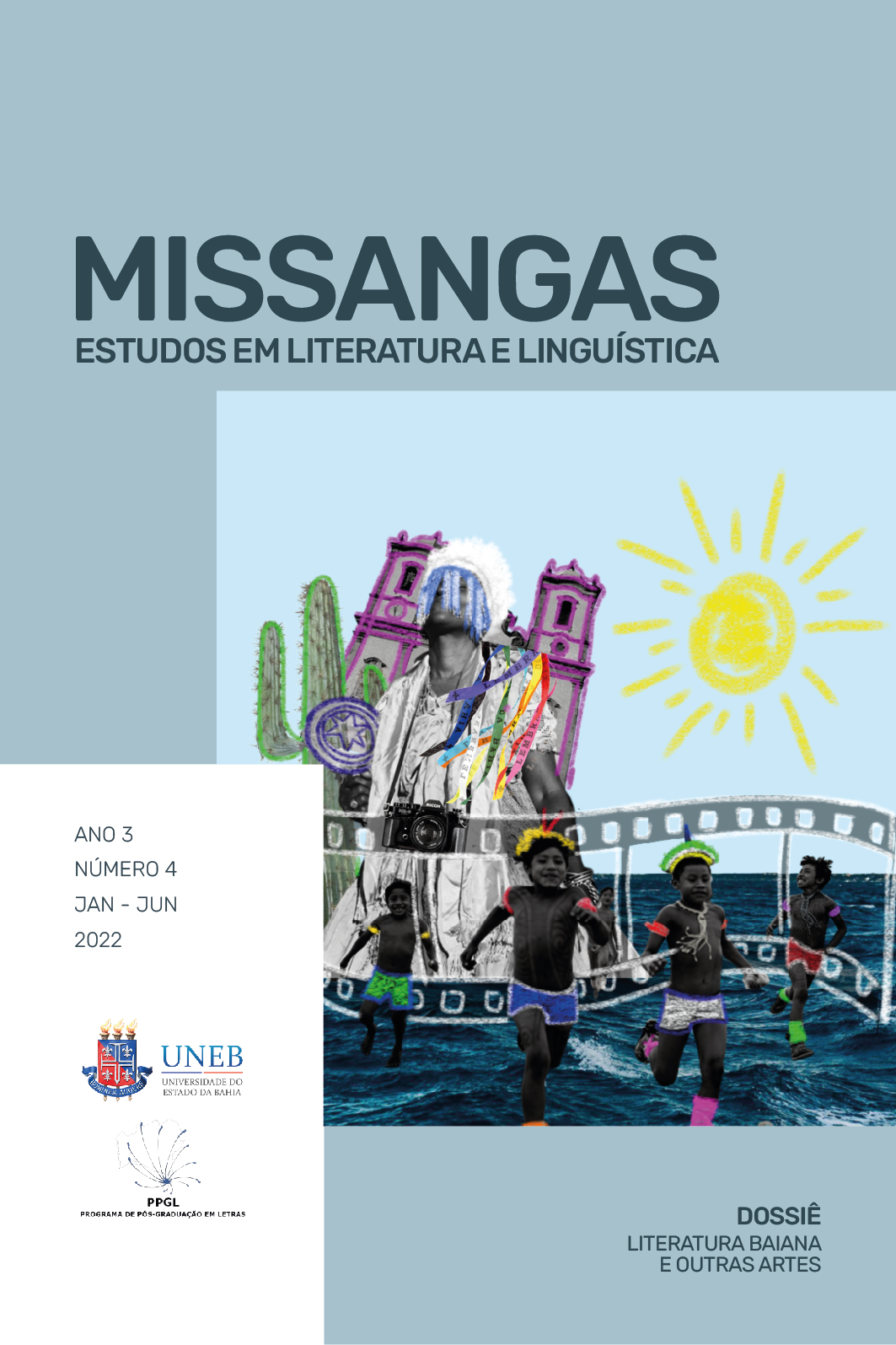NHÔ GUIMARÃES: REFLEXÕES SOBRE O PROCESSO DE ADAPTAÇÃO DA LITERATURA PARA O TEATRO
DOI:
https://doi.org/10.53500/missangas.v3i4.12388Keywords:
Literature; Theatre; Adaptation.Abstract
Reflecting about the literary text adaptation process to a theatrical work is the article primary scope, through the creative trajectory reconstitution of the Nhô Guimarães text, written by Aleilton Fonseca, an author from Bahia, to theatrical montage by the Núcleo Criaturas Cênicas, a theatre group from the city of Salvador, at Bahia. For that, the investigation assumes the qualitative research as a methodological horizon, focusing on the subject's subjectivities, starting from the listening of the main professionals involved in the adaptation: the novel’s author and the play’s actress and director. Some interviews partial results reveal that the experience of adapting from an artistic language to another is a creative act in itself and an another work of art, empirically demonstrating: a) the nature of a scenic adaptation process; b) the expectations senses and feelings: enchantment versus strangeness in an aesthetic appreciation; c) The expansion of artistic frontiers and its consequences in new creations. The text aims to provoke reflection and ideas and stimulate actions and projects by researchers and theatre and literature creators who wish to open a dialogue between an already constructed work, creating another.
Downloads
References
BERRETINNI, Célia. Samuel Beckett: Um Escritor Plural. São Paulo. Perspectiva, 2004.
XXXXX, XXXXX. Ensino de teatro: fundamentos e didática. Salvador: UFBA, Escola de Teatro; Superintendência de Educação a Distância, 2020.
CÂNDIDO, Antônio. O direito à literatura. In: Vários escritos. 5ª ed. Rio de Janeiro. Ouro sobre azul, 2011.
CHEKHOV, Michael. Para o Ator. São Paulo. Martins Fontes, 1996.
FONSECA, Aleilton. Nhô Guimarães. Rio de Janeiro. Bertrand Brasil, 2006.
HELDER, Santos Rocha e DIAS, Márcio Roberto Soares. A Vingança do Sertanejo no Romance Nhô Guimarães de Aleilton Fonseca. Fólio: Revista de Letras, v. 1, n 4, jan/jun, 2012. Acesso em: 05 de junho de 2021. Disponível em: https://core.ac.uk/display/236653352
MARFUZ, Luiz. Beckett e a Implosão da Cena: Poética Teatral e Estratégias de Encenação. São Paulo/Salvador. Editora Perspectiva/PPGAC, 2013.
OLIVEIRA, J. M. de. Do íntimo ao público: adaptação de textos não dramáticos para o teatro. 2012. 131 f. Dissertação (Mestrado em Letras) - Universidade Federal de Ouro Preto, Mariana, 2012. Disponível em: http://www.repositorio.ufop.br/bitstream/123456789/2925/1/DISSERTA%c3%87%c3%83O_%c3%8dntimoP%c3%bablicoAdapta%c3%a7%c3%a3o.PDF Acesso em 12 de janeiro de 2021.
PEREIRA, Daniel Martins Alves. Fragmentos de um Discurso Absurdo: diálogo Entre Esperando Godot, de Samuel Beckett, e “Sarapalha”, de João Guimarães Rosa. Londrina, 2005. Universidade Estadual de Londrina, Centro de Letras e Ciências Humanas, Programa de Pós-Graduação em Letras (dissertação de Mestrado). Disponível em: http:/www.bibliotecadigital.uel.br/document/?code=vtls000110055 Acesso em 16 de maio de 2021.
SANTOS, Adna Evangelista Couto dos. O Processo criativo de Aleilton Fonseca em Nhô Guimarães: Edição Genética e Estudo Crítico. Salvador. 2018. Programa de Pós-Graduação em Literatura e Cultura (tese de doutorado), Universidade Federal da Bahia (UFBA). Disponível em: https://repositorio.ufba.br/ri/handle/ri/28683 Acesso em 10 de junho de 2021.
SANTOS, Adna Evangelista Couto dos Santos e REGINA, Silvia La. Nhô Guimarães, de Aleilton Fonseca: A Gêneses, o Texto Literário e a Memória. In: Anais do XVIII Congresso Nacional de Linguística e Filologia, Universidade Estácio de Sá, 2014. Disponível em: http://www.filologia.org.br/xviii_cnlf/completo/Nh%C3%B4%20Guimar%C3%A3es%20-%20ADNA.pdf Acesso em 13 de abril de 2021.
SANTOS, Gláucio Machado. Iniciação a Direção Teatral: Sugestões Práticas e Aspectos Teóricos. São Paulo. Hucitec Editora, 2019.
Downloads
Published
Issue
Section
License
Os artigos publicados na revista Missangas são de inteira responsabilidade de seus autores e não refletem, necessariamente, o pensamento dos editores.


